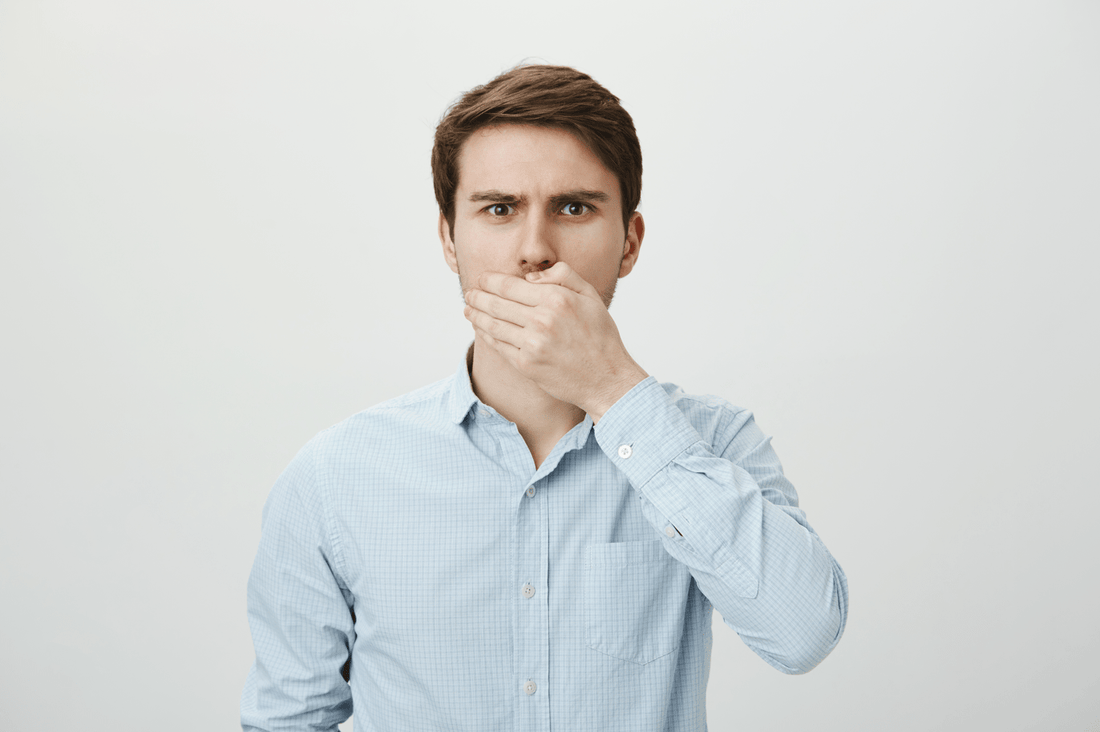The Link Between Diet and Bad Breath: What You Eat Affects How You Smell

The Link Between Diet and Bad Breath: What You Eat Affects How You Smell - Enzim Singapore
Introduction: You Are What You Eat (and So Is Your Breath)
Have you ever noticed that some meals leave your mouth smelling worse than others? Or that even after brushing, certain foods seem to linger? That's no coincidence. What you eat has a direct effect on your breath—sometimes short-term, sometimes more lasting. While brushing and flossing are essential components of good dental hygiene, they aren't always enough, especially for people with bad breath that returns after every meal. Understanding the various halitosis causes is crucial for addressing persistent breath odor, also known as oral malodour or fetor oris.
In this article, we explore the causes of bad breath linked to diet, and how you can make smarter choices—not only with food but also with the kind of toothpaste you use—to truly get rid of bad breath and improve your oral ecosystem.
How Food and Drink Contribute to Bad Breath
Let's break down the ways your diet may be fuelling your breath problems and contributing to smelly and putrid breath.
-
Sulphur-Containing Foods
Garlic, onions, and leeks are rich in sulphur compounds like allyl methyl sulfide. These compounds are absorbed into the bloodstream during digestion and expelled through the lungs when you breathe out, contributing to volatile sulfur compounds (VSCs) in your breath. No amount of brushing can stop this—it must run its course, often resulting in persistent mouth odour. -
High-Protein and Low-Carb Diets
Popular diets like keto or Atkins often lead to a condition known as "ketone breath"—a fruity or metallic odour caused by the breakdown of fatty acids. The body enters ketosis and releases acetone, which contributes to bad breath all the time for some individuals. In extreme cases, this can lead to ketoacidosis, a serious metabolic condition. -
Coffee and Alcohol
Both dehydrate the body, reducing saliva production. A dry mouth, or xerostomia, allows bacteria to thrive, increasing VSCs like hydrogen sulfide—the gases that cause halitosis. These drinks also lower oral pH, contributing to enamel erosion and worsening odour. Excessive alcohol consumption can also lead to other health issues that may indirectly affect breath. -
Sugary Foods and Beverages
Sugar feeds bacteria in the mouth, particularly Streptococcus mutans, which creates acids that cause tooth decay—and bad breath. If you consume sweets frequently and don't clean your mouth properly afterwards, the odour builds up fast, potentially leading to chronic bad breath and oral infections. -
Acidic Foods and Drinks
Citrus fruits, tomatoes, vinegar-based dressings, and fizzy drinks can create an acidic environment that helps harmful bacteria thrive. This is a lesser-known cause of bad breath, but significant for those prone to oral imbalances. Additionally, these foods can exacerbate conditions like GERD and heartburn, which can contribute to halitosis.
People with Bad Breath: Is It Really Just the Food?
The food you eat might trigger bad breath, but people with bad breath that's persistent likely have other underlying issues too. For example:
-
Poor oral hygiene leading to dental plaque buildup
-
Gum disease or gingivitis
-
Dry mouth from medications or medical conditions
-
Mouth-breathing habits contributing to morning breath
-
Enzyme or saliva deficiencies
-
Tonsilloliths (tonsil stones) or caseous tonsillitis
-
Systemic diseases such as diabetes mellitus or kidney disease
-
Sinus infections or chronic rhinosinusitis leading to postnasal drip
-
Liver failure or other metabolic conditions
If your bad breath doesn't improve even with good brushing habits and dietary adjustments, it may be time to evaluate the products you use—starting with your toothpaste. In some cases, an organoleptic examination or gas chromatography may be necessary to determine the root cause of genuine halitosis.
How Enzyme-Based Toothpaste Helps Get Rid of Bad Breath
Typical toothpastes rely on strong mint flavouring or antibacterial agents like chlorhexidine or cetylpyridinium chloride to mask breath odour. While this may seem effective in the moment, it doesn't treat the biological root causes or cure bad breath long-term.
Enzim toothpaste, on the other hand, is formulated to get rid of halitosis by working in harmony with your body's natural defence system—saliva.
How It Works:
-
Supports Saliva Function
Enzim contains natural enzymes that strengthen the antimicrobial action of saliva, helping neutralise VSCs like methyl mercaptan and dimethyl sulfide before they cause odour. -
SLS-Free Formula
Most toothpastes include Sodium Lauryl Sulphate (SLS), a foaming agent that can irritate oral tissues and impair beneficial proteins. Enzim is free of SLS, making it safer for long-term use and more effective to fight bad breath. -
Food-Grade and Halal-Certified
With safe, natural ingredients, Enzim is suitable for sensitive mouths and health-conscious individuals across all age groups, including those with mouth sores or other oral sensitivities.
By supporting the microbiome and enzyme activity in your mouth, Enzim helps you get rid of bad breath more effectively—especially when food is a regular trigger.
Tips to Manage Diet-Related Halitosis
Pairing a smart diet with enzyme-based oral care gives you the best chance to stay fresh throughout the day and prevent bad breath. Here's how to do it:
-
Hydrate Before and After Meals
Water helps flush away food particles and encourages saliva flow. It's particularly helpful after consuming coffee, alcohol, or spicy foods. Consider using a water flosser for thorough cleaning between teeth and in gingival crevices. -
Chew on Raw Veggies or Herbs
Celery, carrots, parsley, and mint naturally cleanse the mouth and promote saliva production, which is essential for bad breath prevention. These foods can also help combat food impaction, which can lead to bacterial putrefaction. -
Rinse or Brush After Eating
If you've had acidic or sulphur-rich food, rinse with water or chew sugar-free gum. Brushing is great, but wait at least 30 minutes after acidic meals to protect your enamel. Avoid using an antibacterial mouthwash too frequently as it can disrupt the oral microbiome. -
Use Enzim Toothpaste Twice a Day
This helps regulate oral bacteria and maintain a healthy balance—key for those who suffer from bad breath all the time or struggle with morning breath. Don't forget about flossing daily and using a tongue scraper for comprehensive oral care. -
Avoid Overusing Breath Mints or Alcohol-Based Mouthwash
These may mask odour but dry out the mouth or upset the natural flora. Enzim supports your oral environment instead of overpowering it, helping to address the root causes of halitosis.
How to Get Rid of Halitosis for Good
To get rid of halitosis, you need to think beyond brushing and mouthwash. Lasting freshness comes from restoring balance to your mouth.
-
Address your dietary triggers
-
Ensure your saliva can do its job
-
Avoid harsh foaming agents
-
Use a toothpaste that reinforces natural defences
-
Clean your tongue regularly to remove tongue coating
-
Practice proper denture hygiene if applicable
People with bad breath often cycle through short-term solutions without realising the issue lies deeper. Enzyme-based oral care like Enzim is not just another minty fix—it's a science-backed way to reduce odour at the source. For those concerned about halitophobia or delusional halitosis, consulting with a healthcare professional may be beneficial.
Conclusion: Diet, Breath, and a Better Routine
Your breath is a reflection of what's happening in your mouth and body. If you've been experiencing bad breath all the time or thinking "my breath stinks," your diet could be playing a bigger role than you realise.
But brushing harder isn't the answer. Instead, adopt a smarter approach to combat mouth odor:
-
Improve your eating habits
-
Stay hydrated
-
Choose products that support—not suppress—your mouth's natural functions
-
Pay attention to overall health, as systemic diseases can affect breath
Enzim helps you make that shift. Designed to work with your biology, it helps get rid of bad breath naturally and effectively—whether it's from garlic pasta or an all-meat diet.
Make the switch today.
Experience fresher breath with Enzim—your daily partner in enzyme-powered oral care.
Available at leading pharmacies and online across Singapore.



